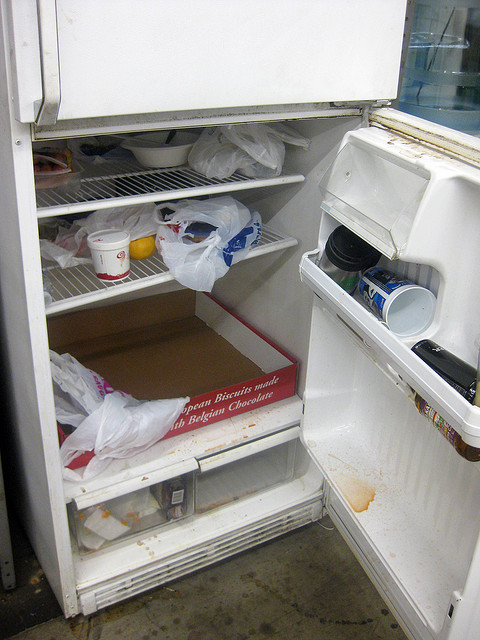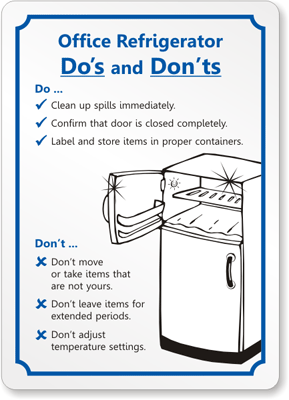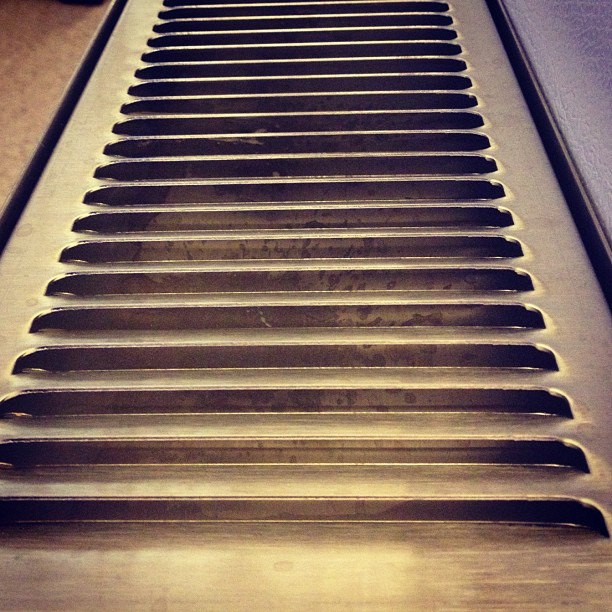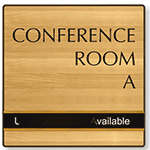The Office Courtesy Series: Office Refrigerator Etiquette
Refrigerators are wonderful inventions, allowing us to store perishable food for weeks at a time. They’re especially ideal to have at work—we can make lunch at home, store it in the fridge at the office, and save money that would otherwise be spent on restaurant food.
However, these useful ice boxes have a downside. They can become really disgusting quickly, and no one notices or seems to care. In fact, most Americans only clean their fridges once or twice a year, and the majority doesn’t know how to properly pack a fridge. For instance, many people might not know that milk or eggs shouldn’t be stored in the door because it’s the warmest part of the fridge.

An unclean office fridge is unsanitary and all too common.
An unclean refrigerator is also a health issue. For example, if meat contains E. Coli, the bacteria in the drippings can fall on fruits and vegetables, which we often eat raw. This, frankly, sounds rather awful!
It gets worse with a communal office refrigerator; no one at the office feels especially obligated to clean up a mess, since it’s not their fridge.
“People throw stuff in the fridge and then it’s there for a long time and starts to smell bad,” says Barbara Kentworthy, employee of MyDoorSign. “The worst problem is that people have to be shamed into doing it (cleaning the fridge) until it really starts smelling bad. Then the same two people who can’t stand it end up cleaning it out—they get stuck with it a lot.”
So, how do we stop this vicious cycle?
Try the simple approach:
- Post a sign that will remind you and your coworkers to clean any spills or messes you or they cause. This practice has become increasingly popular in businesses; Sub-Zero, a refrigerator manufacturing company, placed its appliance manual on the inside of the door so people wouldn’t throw it out when they bought the fridge.
- Put stickers in the fridge labeling where everything should be placed. For people who store food for more than a day, indicate where vegetables, cheese, milk, and other food should go, in order to keep the refrigerator in order.

Signs are a permanent visual reminder to keep the fridge clean at work.
Put up this office refrigerator courtesy sign. View here.
Set a list of rules that everyone can agree on:
- Clean up spills immediately. Since food residue carries various bacteria, wipe up immediately after any spills instead of leaving it there to dry and stick to the refrigerator. This is aesthetically unpleasing and a health risk.
- Set a limit to how long certain foods are allowed in the refrigerator. This will help prevent pungent foods such as cheese, fruit, and chicken from rotting.
- Label your food. Drama at the office is never fun, and you never know how angry people can get when they find their beautiful lunch gone. Bloody wars have been fought for food. Don’t underestimate your coworkers.
- Make sure the door is closed completely. If the door is open even slightly, cold air will escape and food will spoil.
- Don’t adjust the temperature settings.
- Store your food in proper packaging. Don’t leave a salad or a plate of pasta uncovered in the fridge; it will go bad quickly. Buy a plastic container for your lunch, or wrap it in plastic or aluminum foil.
- Keep a schedule regulating who should clean the refrigerator and when (though, if everyone follows the rules this shouldn’t have to happen too often). Catherine Cutter, associate professor and food safety extension specialist at Penn State, advises to clean places that might contain bacteria: the door handle as well as the drip tray under the ice and water dispenser.

The drip tray of a fridge is a breeding ground for germs.
“I’m always sending out emails reminding people. People have to be embarrassed into cleaning it,” Barbara says. Keeping the office refrigerator clean is a group effort, and the fridge won’t clean itself. Let’s not resort to public (or private) shaming.
–by Ruthie Portes
Category: Office courtesy















